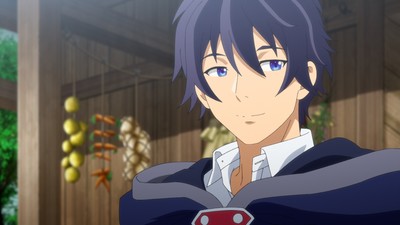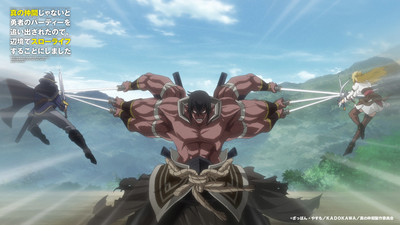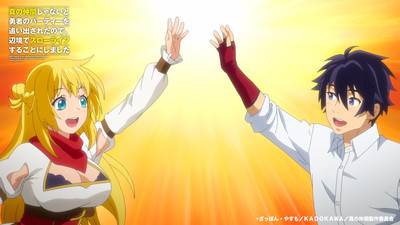Banished from the Hero's Party
Episodes 1-3
by Richard Eisenbeis,
How would you rate episode 1 of
Banished from the Hero's Party ?
Community score: 3.9
How would you rate episode 2 of
Banished from the Hero's Party ?
Community score: 4.1
How would you rate episode 3 of
Banished from the Hero's Party ?
Community score: 4.2
(*Note: The review of the first episode is copy-pasted from when I reviewed it for The Fall 2021 Preview Guide—which also includes a review of this episode from other ANN reviewers. The episode 2 and 3 portion of the review is completely new.)
 Episode 1:
Episode 1:As a longtime player of JRPGs, I am well acquainted with the “not a true companion trope.” In countless games, you get a character who joins the party for a limited time and then stays behind to do their own thing (or dies) while the main party continues their world-spanning adventure. It's an interesting idea to center a story around one of these characters.
In this case we follow Red, who was the mentor to the hero—the Obi-Wan to this world's Luke—when they were just starting their journey. However, the world is literally built in a way that ensures he never can never keep up, because each person in this world has a blessing that determines what they can achieve. When he is unceremoniously told by the party's sage that he is now dragging everyone down, he leaves, exiling himself to the furthest frontier to live a simple life under an assumed name. This speaks to the insecurity he feels. However, with his life's mission complete, he has the opportunity to choose a new one of his own.
That is what this series looks to be about. Red is lost and is trying to find himself. He is no longer in the hero's party and is trying to find out what exactly that means. While he's focused on building a non-heroic life as an herbalist, he still wants to help people. But where exactly does the line between “helper” and “hero” lie? While it's easy to blame Albert and his party for burning the woods—and making it so a needed medicine is now impossible to make—the whole situation could have been avoided if Red had just killed the owlbear when he had the chance.
Moreover, while he might not be the strongest fighter in the world, Red has gone from striving to break his limits to living far below them. Everyone can tell on some level he is not what he appears to be. In a very real way, he is wasting his potential. Is it moral for him to help so much less than he is able to or is this his just reward for raising the hero who will save the world? It's a good question and one I look forward to exploring as the anime progresses.
Rating:
 Episode 2:
Episode 2:The second episode of Banished from the Hero's Party is largely an info dump to get us up to speed on who Rit is. Her backstory, though taking the vast majority of the episode, does feel a bit rushed—but we get the basics. She is a princess and when the Demon King's army invaded, she was able to lead her people and fight them off. When Ruti's party arrived, Rit rejected their help—feeling that her kingdom could stand on its own. Sadly, what she didn't know is that her sword teacher (one of the kingdom's main generals) had been replaced by a high-level demon. Thus, she and her most experienced men were led into a trap—with her and Red as the only survivors.
But it's at this point that we can read between the lines and see why Red is so important to Rit. While Red saw Rit as just another member of the party, Rit sees Red as the person who believed in her at her lowest point—who convinced her to stand up and do what was right for her kingdom. Because of this, she and the heroes' party were able to save her kingdom in the end. Even now, she continues to live as he told her—even going into self-imposed exile to prevent a war of succession in her Kingdom.
It's no surprise that Rit's gratitude morphed into love. Yet, when he was with the heroes' party, he had to move on to the next adventure while she had to stay behind and help her kingdom recover. However, now that he is free from his responsibilities and she from hers, she's not going to let a chance to be with him pass her by—no matter how pushy she has to be.
One of the small touches that makes this story work is Rit's voice acting work. When she is acting as a haughty princess, her voice is high-pitched and full of pride. But as she gets to know Red and she drops her guard, her voice pitch drops as well. In the flashback, we see her alternate between these two voice tones but in the present, it's only the latter. She is showing her true self to Red with no filter. Character growth through voice acting alone? I'm here for it.
Rating:
 Episode 3:
Episode 3:While divine blessings have been mentioned before, episode 3 gets right into the nitty-gritty. It may seem cool to be born as the “sage” or “hero” but we see here that blessings are a double-edged sword. To start with, you need to level up your blessing—however, there is only one way to do this: killing things with a divine blessing of their own. This means that even if you're a chef or a doctor, you have to go out and kill monsters/people in order to become better at your job.
But the other downside is even more sinister. Blessings influence personality—making you more predisposed to acting in your divinely assigned role. You can have the next king be a thief or poor farmer's boy be a librarian—and they just have to find some way to incorporate this into their lives. And it's not just a minor compulsion either, in this episode, we see a formerly kind boy who has become a violent bully thanks to his divine blessing.
Yet, the most interesting thing to come out of this is the subtext of what this means for Red himself. His blessing was to guide the hero until she could stand on her own. He clearly succeeded and so his role is finished. This means that Red, unlike everyone else in his world, has true free will. He is no longer a pawn of the gods. His emotions and personality are his and his alone.
The other important part of this episode is that we get to see what is happening to the heroes' party without Red—namely that they are on the edge of falling apart. Red's unannounced departure has already caused one party member to quit—sure that the sage had, in fact, murdered Red and covered it up. Likewise, a second member wants to leave the party as progress has almost completely stalled.
While it may be true that Red was starting to slip on the combat side of things, fighting was not his main role in the party. Rather, he was the diplomat who got the party local help. He also managed the logistics to make sure everyone was well supplied. Hell, he even cooked the food. Ares may be a powerful magic user but his egotistical nature makes him a poor replacement for Red in pretty much every conceivable way.
So now, as Danan sets off to find Red, we are left with a low-key cliffhanger. Will Red forsake his new life and burgeoning love to return to the war and his sister—and perhaps more importantly, what will it mean for the fate of the world if he won't?
Rating:
Random Thoughts:
• While it's somewhat cleared up in episode 3, I did want to point out a translation issue in episode 2 that I feel makes this episode more confusing than it should have been. In the official subtitles, Rit is introduced as “the Hero Rit.” You might think this means she has the same blessing as Ruti. However, this is not correct. In Japanese, Rit is referred to as “Eiyū” while Ruti is called “Yūsha.” While both can be translated as “hero,” Eiyū is a hero in the general sense—like a firefighter, soldier, or everyday person who saves someone's life. Yūsha, on the other hand, is specifically the divinely chosen hero who will save the world from evil. Tensura, when it came upon a similar issue, translated Eiyū as “champion” instead of hero. I feel something similar should have been done here as well.
• Ruti meeting Tisse is the greatest little example of the difference between Kuudere and Dandere.
• Crawly Wawly is best girl. (Note: I'm not sure if Crawly Wawly is, in fact, a girl.)
• I have no doubt that Rit was awake and posed herself to show the most possible cleavage in episode 3's opening scene. It's clear she's trying to seduce Red and is annoyed that he continues to pass on the most obvious bait she lays out.
• Rit's blessing basically makes her Aragorn—a wandering ranger who also happens to be royalty. Living in a town and working a 9 to 5 with Red isn't in her nature—no matter how much she loves him. I wonder how long she can resist her blessing—and what the negative effects are of her fighting it.
• Ruti's emotionless demeanor makes her seem terrifying and imposing. But I wonder how much of this is “Ruti” and how much is her divine blessing.
Banished from the Hero's Party is currently streaming on Funimation.
Richard is an anime and video game journalist with over a decade of experience living and working in Japan. For more of his writings, check out his Twitter and blog.
discuss this in the forum (166 posts) |
this article has been modified since it was originally posted; see change history
back to Banished from the Hero's Party
Episode Review homepage / archives